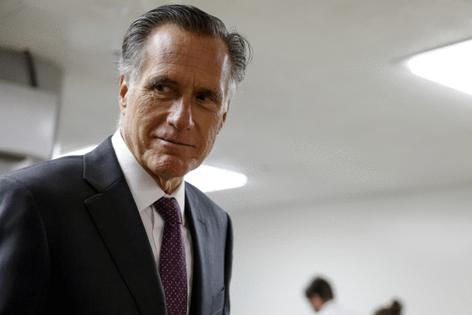David Mills: The humane way to talk about economics
Published in Op Eds
"I knew that of course most private-equity investors make the U.S. economy stronger," the man wrote, a little indignantly. I'd come across the quote, from The City Journal in 2012, while looking for something else. It's published by the conservative Manhattan Institute for Policy Research, and prestigious enough for Barnes & Noble to sell it.
Its former editor Myron Magnet complained that Mitt Romney's presidential campaign never answered the charge that his private equity firm had done nothing but exploit people to make vast amounts of money.
Romney, you may remember, became famous for saying to very wealthy supporters at a private event that 47% of Americans "will vote for the president no matter what. ... They are dependent upon government, they believe that they are victims, they believe that government has a responsibility to care for them." He meant it the way it sounds: These leeches want to steal your money.
Magnet went on: "Of course they add to the wealth of the nation by restructuring companies for efficiency while helping to create a new class of customers in previously underdeveloped countries. Of course they are part of the 'creative destruction' that is the essence of capitalism."
Troublingly indifferent
Let's assume Magnet was right about the economics. It's hard not to make money when you can break whatever you want to break. And whomever you're willing to break.
Even if he is right that (I think he meant this though he didn't quite say it) his policies will someday make the world better, there's something troublingly indifferent about the way he speaks of "restructuring companies for efficiency," "creative destruction," "the destruction of some American jobs," and "the grand scheme." It's inhuman, because the words suggest these great things don't affect real people and real communities.
Real fathers, for example, who have to come home to tell their wives and children that they no longer have an income. Being able to say that their company has been restructured for efficiency, and that it destroyed jobs creatively in service of the grand scheme does not feed them, house them, clothe them, educate them, pay the doctor and the pharmacist, the gas and electric bills, the rare family dinner out at the cheap diner.
Restructuring, creative, grand scheme — those are someone else's abstractions. And someone else's profits. Notably among them, the profits of the people whose donations keep the Manhattan Institute going.
Magnet was not a libertarian idealist but a respected mainstream conservative. Judging from other writings of his, he's not unaware of the problems of the poor, but the way he speaks here erases them from consideration. What good is an economic theory that has no concern for so many people? What sort of world will it produce?
Those who refer so happily to creative destruction are never themselves among the creatively destroyed. It's the ideological free-marketer's version of "Let's you and him fight." It speaks of the end in a way that makes invisible those who suffer from the means. A lot of people on the right talk like this.
The rhetorical option
The poor are not collateral, forgettable damage in the process of creating wealth, as the language of "creative destruction" makes them. Even if over time the unmolested market produces the greatest good for the greatest number — and economic freedom has had extraordinary effects — we should not forget the losses and the "losers" in the way we speak about economics.
Their ends and interests should form the way we speak, and thus what we decide to do. We need what might be called a preferential rhetorical option for the poor as part of the normal and normative way we speak about economics.
I take the term from the Catholic teaching on the "preferential option for the poor." The term refers to the church's insistence that the poor go first in the distribution of goods, defined broadly to include not only the physical necessities of life but rights like religious freedom and economic opportunity.
Not everyone feels bound by Catholic teaching, of course, but I think everyone should know that basic human kindness and solidarity, and what Orwell called "decency," require him to remember the "losers" when he speaks about success.
It's Humanism 101. People over profits, as it's been put. Orwell, an atheist, would agree with what I've written.
Who is the poor is a difficult question, but these days it includes much of the middle class, whose jobs can be taken away by people who restructure companies for efficiency. The key is not how much money they have but how vulnerable they are.
The poor should go first in the distribution of the good of attention. Any sustained statement about economic theory should relate that theory to the poor. If an idea is praised for creating wealth, it should be interrogated for its effect on the vulnerable. One should not speak as if real people were not involved and if general improvement were not bought at a great cost to some.
The charitable way
It's the charitable way of speaking. It's also analytically useful: Having to think about the effect on the poor will force the free-marketer to think more carefully about and understand more deeply the process he's praising and the kind of society it will create.
Even the most ardent free-marketer, driven by the most optimistic vision of human flourishing, should, when he speaks of the great future ends of economic freedom, speak also of those affected for the worse now. His wealthy new world should include as many people as possible.
If he must talk about creative destruction, he should speak of and for those it harms. Meaning tens of millions of his fellow Americans and hundreds of millions of his fellow humans.
_____
©2025 PG Publishing Co. Visit at post-gazette.com. Distributed by Tribune Content Agency, LLC.
























































Comments